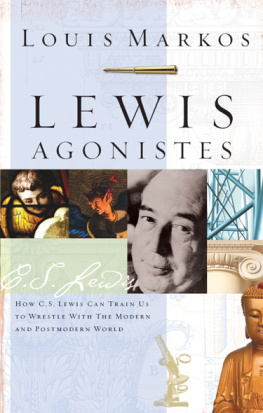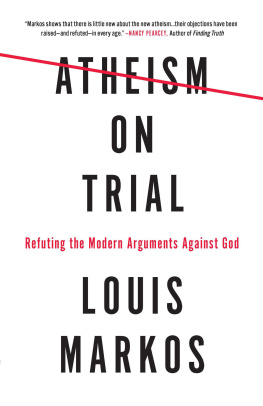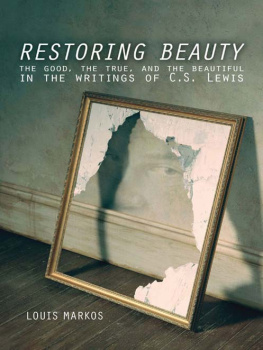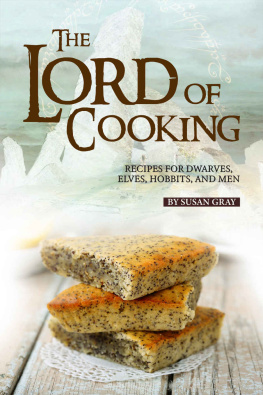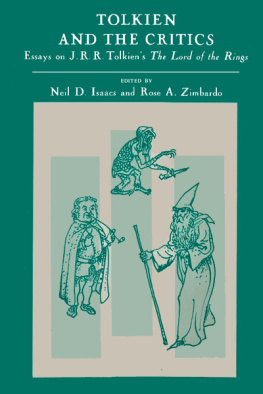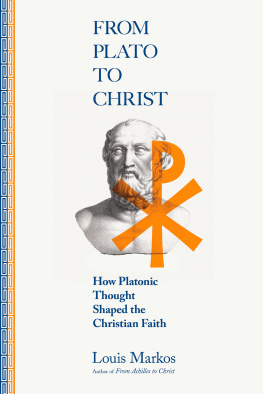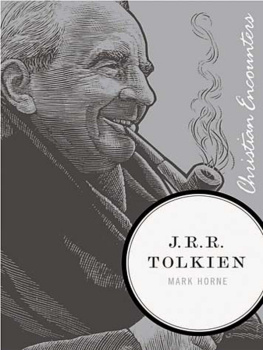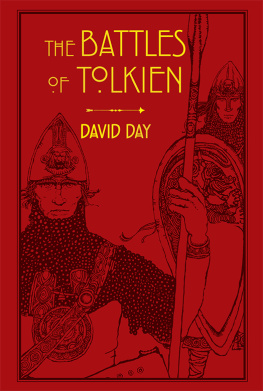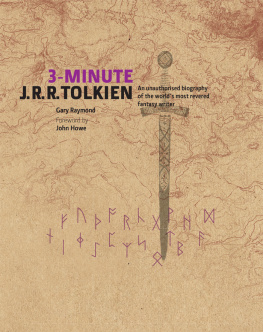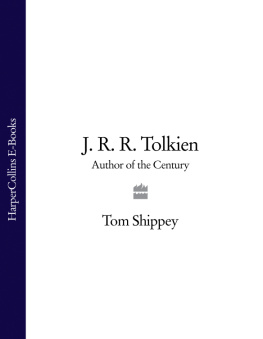Praise for On the Shoulders of Hobbits
Thoughtful, helpful, insightful, On the Shoulders of Hobbits reminds us just how much is to be gained by standing on the shoulders of Tolkien and Lewis, those Christian literary giants.
MICHAEL WARD, Oxford Centre for Christian Apologetics and co-editor of The Cambridge Companion to C. S. Lewis
Louis Markos has written a helpful guide to the moral and spiritual realities embodied in J. R. R. Tolkiens hobbit tales and C. S. Lewis Narnian novels. Here he probes the darkness of evil, the perils of pilgrimage, the terror and gift of death, as well as the summons to shape our lives according to all seven of the virtues: discernment and justice, courage and temperance, hope and faith and love. In so doing, he recovers a Christian humanism for an age that remains largely blind and deaf to the sacred drama of Gods mysterious work in the world.
RALPH C. WOOD
University Professor of Theology and Literature
Baylor University
The mistake that Uncle Andrew made was not that he believed wealth could be brought back from Narnia. His mistake was in refusing to bring back the right kind of wealthit is wisdom we need, not more steel and battleships. Louis Markos has remedied that problem, importing a great deal of wisdom from Narnia, and Middle Earth as well, with plenty to spare. I am happy to recommend On the Shoulders of Hobbits.
DOUGLAS WILSON, author of What I Learned in Narnia
Louis Markos thoughtful exploration of virtue through the writings of J. R. R. Tolkien and C. S. Lewis is a valuable resource for parents, teachers, and young people seeking models and guides for living a life shaped by, and infused with, the richness of Christian virtues.
HOLLY ORDWAY, Houston Baptist University and author of Not Gods Type
A book that richly celebrates the place of story in our liveseven as it invites us to walk the road with, and glean life lessons from, some of J. R. R. Tolkiens finest characters.
KEVIN BELMONTE, editor of A Year with G. K. Chesterton, and lead historical consultant for the film Amazing Grace

2012 by
LOUIS MARKOS
All rights reserved. No part of this book may be reproduced in any form without permission in writing from the publisher, except in the case of brief quotations embodied in critical articles or reviews.
All Scripture quotations, unless otherwise indicated, are taken from the King James Version.
Scripture quotations marked NKJV are taken from the New King James Version. Copyright 1982 by Thomas Nelson, Inc. Used by permission. All rights reserved.
Scripture quotations marked NIV are taken from the Holy Bible, New International Version, NIV. Copyright 1973, 1978, 1984 by Biblica, Inc. Used by permission of Zondervan. All rights reserved worldwide. www.zondervan.com
Scripture quotations marked RSV are from the Revised Standard Version of the Bible, copyright 1952 [2nd edition, 1971] by the Division of Christian Education of the National Council of the Churches of Christ in the United States of America. Used by permission. All rights reserved.
Excerpts from The Lord of the Rings by J. R. R. Tolkien, edited by Christopher Tolkien. Copyright 1954, 1955, 1965, 1966 by J. R. R. Tolkien. Copyright Renewed 1982, 1983 by Christopher R. Tolkien, Michael H. R. Tolkien, John F. R. Tolkien, and Priscilla M. A. R. Tolkien. Copyright Renewed 1993, 1994 by Christopher R. Tolkien, John F. R. Tolkien, and Priscilla M. A. R. Tolkien. Reprinted by permission of Houghton Mifflin Harcourt Publishing Company. All rights reserved.
The Lion, the Witch and the Wardrobe by C. S. Lewis copyright C. S. Lewis Pte. Ltd. 1950.
Prince Caspian by C. S. Lewis copyright C. S. Lewis Pte. Ltd. 1951.
The Voyage of the Dawn Treader by C. S. Lewis copyright C. S. Lewis Pte. Ltd. 1952.
The Silver Chair by C. S. Lewis copyright C. S. Lewis Pte. Ltd. 1953.
The Horse and His Boy by C. S. Lewis copyright C. S. Lewis Pte. Ltd. 1954.
The Magicians Nephew by C. S. Lewis copyright C. S. Lewis Pte. Ltd. 1955.
The Last Battle by C. S. Lewis copyright C. S. Lewis Pte. Ltd. 1956.
The Four Loves by C. S. Lewis copyright C. S. Lewis Pte. Ltd. 1960.
Edited by Christopher Reese
Cover Image: Steve Gardner/PixelWorks/istock
Interior design: Smartt Guys design
Author Photo: Michael Tims
Houston Baptist University
Cover design: Brand Navigation, LLC
Library of Congress Cataloging-in-Publication Data
Markos, Louis.
On the shoulders of hobbits : the road to virtue with Tolkien and Lewis / Louis Markos.
p. cm.
Includes bibliographical references and index.
ISBN 978-0-8024-4319-9
1. Tolkien, J. R. R. (John Ronald Reuel), 1892-1973Criticism and interpretation. 2. Lewis, C. S. (Clive Staples), 1898-1963Criticism and interpretation. 3. Christianity and literature. I. Title.
PR6039.O32Z6936 2012
823.912dc23
2012022461
We hope you enjoy this book from Moody Publishers. Our goal is to provide high-quality, thought-provoking books and products that connect truth to your real needs and challenges. For more information on other books and products written and produced from a biblical perspective, go to www.moodypublishers.com or write to:
Moody Publishers
820 N. LaSalle Boulevard
Chicago, IL 60610
1 3 5 7 9 10 8 6 4 2
Printed in the United States of America
For Alex and Stacey
For enjoying these tales with me
And allowing me to see them through new eyes
CONTENTS
W hy should I read this book? What is it about? Thats the question you want a foreword to answer.
Well, this book is about life. Your life. Its not fantasy, its realism. Its the so-called realistic books that are usually fantasy. When you close the covers of The Lord of the Rings or the Chronicles of Narnia, you intuitively know that you are not exiting an unreal world and entering a more real one, but exactly the opposite.
The best educational advice for life that I ever heard was my fathers: Just be sure you dont get all As in your subjects but flunk life.
We humans are the only beings in the universe who can flunk life, because we have a free choice about what kind of life we will lead and what kind of human beings we will be, good or evil. We make these choices not, like angels, instantly and timelessly, but gradually, in each of our many big and little choices between good and evil throughout the drama that is our lifetime.
How do we become good or evil? When Plato asked in his Meno how human beings become good (virtuous), he suggested four ways: (1) by teaching (knowledge is virtue); (2) by practice (forming habits); (3) by nature (i.e., being born virtuous); (4) in some other way (i.e., against nature, by force). Most philosophersOriental as well as Westerngive one of these four answers: Plato, #1; Confucius, #1 and #2; Aristotle, #2; Rousseau and Lao Tzu, #3; Hobbes and the Realists, #4.
All these philosophers are wrong, probably because most of them do not have children. Parents and children know the answer: by example. By having moral heroes.
Thats why reading great literature, next to meeting people, is the single most effective way to learn not to flunk life. Life is a story, and therefore moral education happens first and most powerfully through stories, e.g., through books.


